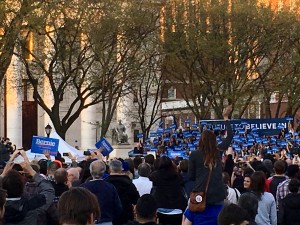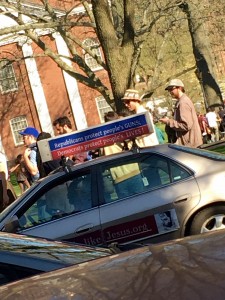On the 24th of April, thousands of people poured onto the New Haven Green to support—and appreciate the populist spectacle of—Bernie Sanders. For investigative purposes, I was among them.
The Sanders campaign garnered an unprecedented level of support from unconventional left wingers and democrats alike, and though the campaign has now run its course, on that particular day in April, the Political Revolution had arrived in full force.
Mobile rhetoric adding to the raucous scene surrounding the New Haven green during the rally
The crowd could be split into two camps – Yalies, who had walked the block from campus to the Green, decked out in their college garb, and New Haveners, in a mix of Bernie shirts and costumes coming from the community at large. Economically, the groups differ as well – New Haven is a large city with many severely impoverished areas, with Yale at its sheltered hub.
Watching the crowds before the speech was intriguing. Yalies, who made up the greater portion of the crowd, pressed close to the stage, many hoping for a coveted selfie with the Senator. Farther away stood a greater concentration of New Haveners.. Couples, families with small children, and groups of friends boasted signs. Others seemed to stand in sheer curiosity.
Excited crowds waving signs and waiting for Bernie
The crowd roared as Sanders walked out on stage, both arms raised victoriously. He delivered his speech in the usual fashion – citing percentages while his arms waved like a conductor’s. His rhetoric drew the watching crowd in, making them hang on every word. Much of the crowd, however, seemed put off when Sanders proposed to “tax the endowment;” Yale’s endowment.
Sanders’ proposal drew strongly upon the rhetoric of income inequality. The senator emphasized that no student from New Haven could even dream of attending Yale; the institution was too rich and gluttonous, and New Haven students faced daily economic hardship. Much of the crowd’s excitement seemed to dissipate. Many Yalies squirmed uncomfortably. 57% of students at Yale are able to receive financial aid from the institution thanks to the endowment’s existence. As with other Ivy League schools, many students pay nothing. The timing of Sanders’ remarks made this particular rant a touchy one for Yalies: in the preceding months the state of Connecticut threatened to tax the endowment if the state’s financial crisis continued.
Yale University’s record endowment of $25.6 billion is the second largest in the country, behind Harvard’s, and the school posted an 11% gain in 2015, earning approximately $2.6 billion dollars in investment gains. In 2016, the state of Connecticut faces a shortfall of more than $200 million and is looking to the endowment to help fund necessary services.
One of Yale’s courtyards, behind the gate separating the campus from New Haven. Yale is situated in the middle of New Haven, a city with a growing gap between wealthy and the poor. Yale University’s record endowment of $25.6 billion is the second largest in the country, behind Harvard’s, making it possible for admitted students with family incomes below $65,000 a year to attend for free.
What does a federal endowment tax mean for the two camps? For Yalies, it means decreases in the availability of financial aid. For New Haveners, it could mean economic stagnation as financially stressed Yalies spend less in the community or come in fewer numbers. For Yale itself, less money is available to revitalize its the surrounding community. And for the young discounted New Haveners who might dream of attending Yale, an endowment tax would bring truth to Sanders’s claim. After an uncomfortable lag in the cheering, some booed the statement. What Sanders was missing was the fact that Yale pays $2.2 billion in annual wages and benefits to its employees; that Yale gives 760 college scholarships through the New Haven Promise program which directly target students in New Haven schools; and that Yale makes a voluntary contribution to the City of New Haven of more than $8.2 million each year, and more than a third of Yale employees live in New Haven, bringing money into the local economy each year. Additionally, Yale’s endowment makes it possible for students from families with annual incomes below $65,000 to attend school for free. This policy makes it possible for low income students from cities like New Haven, where schools have nearly 60% of students eligible for free and reduced lunch, to attend.
A child taking in the sights of New Haven and the rally
The atmosphere was not angry or riotous, but it was certainly uncomfortable. Sanders brought his trademark energy with him, and the cheers rang for the hours preceding and following his appearance. But the New Haven Green marked a place where the real world of economic hardship, and an institution serving as a means of social mobility, collided with the dreams of a man to take down the top one tenth of one percent. And the notion that the hard working beneficiaries of Yale do not fit with Bernie’s economic goals nor the average New Havener’s reality became a little bit harder to ignore.



